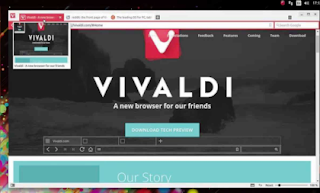Everyone knows that it won't displace Google's Chrome anytime soon, but startup Vivaldi has won over a respectable chunk of users in its six months since launch.
The Oslo-based company is a philosophical offshoot of the Opera browser. Opera came from the same city and, in part, from the same man, Jon von Tetzchner. After leaving Opera Software in 2011, he channeled his energy into startup investing. But in 2014, he decided to focus on a new browser with customization tools for people who consider Chrome and Firefox too simple.
By catering to power users and by trying to build in their feature requests rapidly, Vivaldi now has nearly a million active users each month, von Tetzchner told CNET last 10 May. "We need a few million users to be profitable, say 5 million," he said. "Our plan is to grow from there" and hire beyond the current staff of 35 to expand in new directions.
It's a tough time to launch a browser business. Google's Chrome is dominant. Since its debut in 2008, Chrome has surpassed Mozilla's Firefox, Apple's Safari and longtime leader Microsoft's Internet Explorer. Google continues to aggressively develop and promote Chrome for personal computers, phones, tablets and Chrome OS laptops popular at schools.
But there are plenty of options for anyone looking for a fresh approach to the Web. They include Brave from Mozilla co-founder Brendan Eich; Baidu Browser from the Chinese Internet giant; Yandex Browser from Google's biggest competitor in Russia; and UCweb, a mobile browser that Chinese Internet power Alibaba acquired. Even Microsoft is in the game, trying to move IE users to its new Edge browser.
Among Vivaldi's options is the ability to control the browser with mouse gestures -- for example, closing a tab by clicking and dragging down and to the left. The upcoming Vivaldi 1.2, set to debut at the end of May, will let you create new mouse gestures of your own and assign them to a wide range of commands, von Tetzchner said.
Also coming in 1.2 is the ability to "hibernate" a group of tabs, storing them away so they don't clutter your screen or burden your computer's memory, then reconstituting them when needed later. And users will be able to type in a custom zoom level by clicking on the zoom percentage in the lower right of the screen, at least if they've set Vivaldi to show a status bar across the bottom of the page, a feature other browsers have scrapped.
Later this year, Vivaldi plans to release version 2.0, a major update that will bring a cast-off Opera feature: integrated email aimed at people who have to wrestle with several accounts, according to von Tetzchner.
The Oslo-based company is a philosophical offshoot of the Opera browser. Opera came from the same city and, in part, from the same man, Jon von Tetzchner. After leaving Opera Software in 2011, he channeled his energy into startup investing. But in 2014, he decided to focus on a new browser with customization tools for people who consider Chrome and Firefox too simple.
By catering to power users and by trying to build in their feature requests rapidly, Vivaldi now has nearly a million active users each month, von Tetzchner told CNET last 10 May. "We need a few million users to be profitable, say 5 million," he said. "Our plan is to grow from there" and hire beyond the current staff of 35 to expand in new directions.
It's a tough time to launch a browser business. Google's Chrome is dominant. Since its debut in 2008, Chrome has surpassed Mozilla's Firefox, Apple's Safari and longtime leader Microsoft's Internet Explorer. Google continues to aggressively develop and promote Chrome for personal computers, phones, tablets and Chrome OS laptops popular at schools.
But there are plenty of options for anyone looking for a fresh approach to the Web. They include Brave from Mozilla co-founder Brendan Eich; Baidu Browser from the Chinese Internet giant; Yandex Browser from Google's biggest competitor in Russia; and UCweb, a mobile browser that Chinese Internet power Alibaba acquired. Even Microsoft is in the game, trying to move IE users to its new Edge browser.
Among Vivaldi's options is the ability to control the browser with mouse gestures -- for example, closing a tab by clicking and dragging down and to the left. The upcoming Vivaldi 1.2, set to debut at the end of May, will let you create new mouse gestures of your own and assign them to a wide range of commands, von Tetzchner said.
Also coming in 1.2 is the ability to "hibernate" a group of tabs, storing them away so they don't clutter your screen or burden your computer's memory, then reconstituting them when needed later. And users will be able to type in a custom zoom level by clicking on the zoom percentage in the lower right of the screen, at least if they've set Vivaldi to show a status bar across the bottom of the page, a feature other browsers have scrapped.
Later this year, Vivaldi plans to release version 2.0, a major update that will bring a cast-off Opera feature: integrated email aimed at people who have to wrestle with several accounts, according to von Tetzchner.


No comments:
Post a Comment